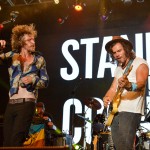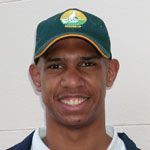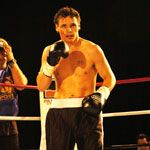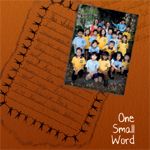
Where were you born?
In Tamworth.
Did you do all your growing up in Tamworth?
Until I was 19. Then I joined the Royal Australian Air Force.
Do you come from a musical family?
Yes, on both sides.
Do you come from a big family?
My family consisted of four brothers and two sisters.
Three of my four brothers – Walter, Eric and Malcolm – were into boxing. Eric fought in New Zealand for the Australian title as a lightweight. The other one, Ronny, played professional football for Newcastle (Waratah Mayfield).
I have two sisters: Gwen and Sheryl. Sheryl has been involved in the music industry for the last 15 or 20 years and now lives in Nambucca Heads.
What are your fondest memories from when you were young?
I remember Dad teaching me to play the button accordion and piano accordion, and then playing duets with him. I learned to play the guitar when I was about 12 or 13.
I was also selected for country zone representative teams in both netball and basketball when I was 18 or 19.
How did you get started in music?
By entering talent quests, singing at family gatherings and in church, where I used to sing harmonies with my father. All the music I learned was by ear.
Did you master any one particular instrument or were you mainly a singer?
Both. Harry Williams taught me to play bass guitar. I had already been taught to play guitar by my family, so bass wasn’t hard to master. I was a natural singer, having sang with my family since I was young.
Which bands and performers have been your musical influences?
Patsy Cline and Jean Sheppard. There was really no one in Australia who inspired me at the time; most of the women singers in those days were ‘yodellers’. The first song I ever bought was Patsy Cline’s “Crazy”. I liked a lot of her songs in the ’50s and ’60s because of the way she sang.
How did you and Harry meet?
We first met in Newcastle at a mutual friend’s house. Harry had been told by an agent that his band, The Tjuringas, needed a female singer, so he was looking for one. There was a jam session going on and someone said that Wilga Williams could sing. That night he asked me to join the band as the bass player and the rest is history. I was 23 at the time.
What was the name of the first song you recorded?
“Nullarbor Prayer”, which was on the Country Outcasts’ first album. We recorded it at a record studio in Currabubula. It took about three or four days to record and was written and narrated by a fellow called Eric Onus who came from Melbourne. It got quite a bit of airplay on community stations in Melbourne.
What are some of your memories of playing with the Country Outcasts?
We used to organise country music festivals all around Australia. Sometimes they would run over two days and sometimes only one day. We would take those who won first and second place from each state and invite them to Tamworth for the national finals. There was some fantastic talent and a lot of them ended up forming their own bands.
I also remember my whole family performing at the Wandong Country Music Festival in 1975, and also playing at the ‘All Aboriginal’ Spectacular Show in Tamworth in 1995.
When you look back, what have been your career highlights?
Performing at the Sydney Opera House in 1978 for Aboriginal Week with a variety of Aboriginal artists, and at Melbourne’s Myer Music Bowl in 1980 at the FEIP (Free Entertainment In Parks) Festival.
Are you still performing regularly nowadays?
Only on special occasions like the Deadlys or a promotion for Aboriginal health. There’s also a folk festival I’ll perform at in Canberra early next year, which I’m looking forward to.
Did you enjoy performing at the Deadlys?
I absolutely loved it. It was a very interesting venue with a big crowd and a great atmosphere. I really enjoyed playing alongside high-quality performers. I didn’t really get excited or nervous until just before I went on!
Do you have a favourite Indigenous performer at the moment?
Troy Cassar-Daley. Everything he is doing nowadays is much like what we were doing back then. He’s flying the flag for Aboriginal country music in Australia and abroad.
What message would you like to give any young people out there who have a yearning to sing or play an instrument?
Keep trying and learning. You have to be committed to what you are doing, because nothing comes easy. And don’t be disheartened by negative thoughts!






Comments are closed.